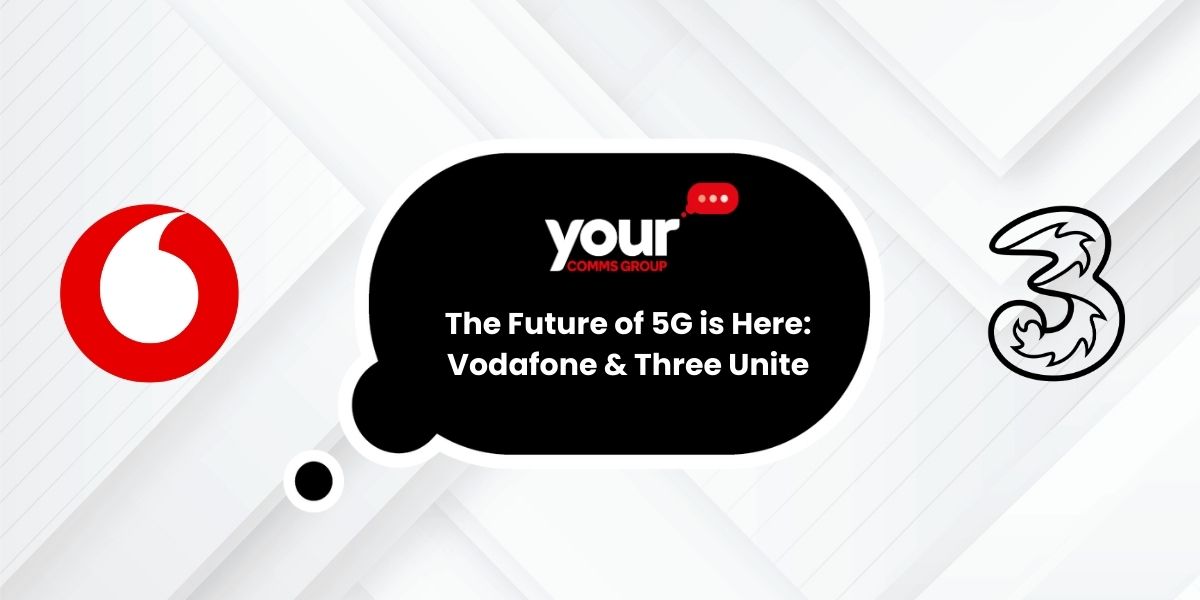The Dawn of a New Era in Telecommunications: Vodafone and Three Merge
In a groundbreaking development, Vodafone UK and Three UK have joined forces, heralding an exciting new chapter for the telecommunications landscape...
3 min read
James Etherington : May 6, 2024 3:00:00 PM

The UK telecommunications sector is poised for a transformative shift with the proposed merger of Vodafone and Three. This move consolidates market powers and sets new precedents for service standards, pricing and innovation.
This analysis explores the multifaceted impacts of significant corporate actions by comparing the EE and BT merger and industry-altering mergers in other sectors, such as Boeing's acquisition of McDonnell Douglas.

Market consolidation in telecommunications is often driven by the need to enhance competitive capabilities and operational efficiency. The merger between Vodafone and Three is expected to create a powerhouse capable of rivalling BT and EE's combined might, potentially controlling a significant share of the UK’s mobile network.
This consolidation mirrors the aerospace industry, where Boeing's merger with McDonnell Douglas in 1997 aimed to solidify its market dominance. While the telecom merger promises improved network capabilities and customer reach, similar to the initial successes of Boeing, it also raises concerns about reduced competition and higher barriers to entry for new players.
The uncertainties surrounding such mergers are manifold. Regulatory scrutiny is a significant hurdle, with concerns about creating monopolistic conditions that could reduce consumer welfare. In the Vodafone-Three case, the UK's Competition and Markets Authority (CMA) is likely to closely monitor the implications for market health, drawing lessons from Boeing’s global post-merger challenges with regulatory bodies, which scrutinised its dominance and impact on pricing and innovation.
One of the often-overlooked consequences of large-scale mergers is the potential for layoffs. Consolidations aim to eliminate redundancies and optimise operations, which can lead to significant job cuts.
The telecom industry, like aerospace, relies heavily on skilled labour, and the human cost of mergers can be substantial. Post-merger integration challenges also include merging different corporate cultures, which was a notable issue in the Boeing-McDonnell Douglas merger. This led to conflicts and inefficiencies that took years to resolve.
Boeing's post-merger era with McDonnell Douglas also highlighted significant quality control issues, most notably in its 737 MAX crisis, partly attributed to aggressive cost-cutting and oversight failures.
For Vodafone and Three, maintaining service quality in the rush to integrate operations and realise cost synergies will be a critical challenge. The telecom sector, being highly service-oriented, faces the risk of degraded service quality and customer dissatisfaction during such transitional periods.
The merger's success will largely depend on how effectively the combined entity can leverage new technologies and expand its service offerings while maintaining customer trust. Investments in 5G, IoT and enhanced broadband capabilities are anticipated, echoing the post-merger expansions in the EE-BT combination.
However, these advancements must be balanced with fair pricing strategies to avoid alienating existing customers and inviting regulatory backlash.
Analysing previous telecom mergers and those in other sectors can provide valuable lessons. For instance, the integration phase of the Boeing-McDonnell-Douglas merger highlighted the difficulties in aligning strategic objectives and operational practices, leading to a prolonged period of performance downturns.
Telecom companies can learn from this by prioritising seamless service continuity and transparent communication with all stakeholders to mitigate the impacts on service delivery and employee morale.
The primary benefits to customers from the Vodafone-Three merger include better network coverage, more comprehensive service packages and potentially lower prices due to economies of scale. However, the risks include reduced competition leading to higher prices in the long term, similar to concerns raised post-EE-BT merger.
Moreover, the quality of customer service during the transition period needs careful management to prevent a decline in customer satisfaction.
Stakeholders, from investors to employees to regulators, must approach the merger with a balanced perspective. Regulatory bodies must ensure that the merger does not stifle competition, drawing from global examples like Boeing, where intense regulatory scrutiny followed the mergers.
Businesses and government bodies must prepare for a market where two major players dominate, requiring new strategies for competition and cooperation.
Engage with Your Comms Group for further insights and strategic guidance during these tumultuous times. Together, we can navigate the evolving telecommunications landscape, ensuring resilience and growth in a rapidly consolidating market.

In a groundbreaking development, Vodafone UK and Three UK have joined forces, heralding an exciting new chapter for the telecommunications landscape...

In the ever-evolving world of telecommunications, mergers and acquisitions between mobile networks have become a common trait, ever since the merger...

In the dynamic retail industry, digital transformation is pivotal in restructuring operations and customer experiences. Retailers face difficulties...